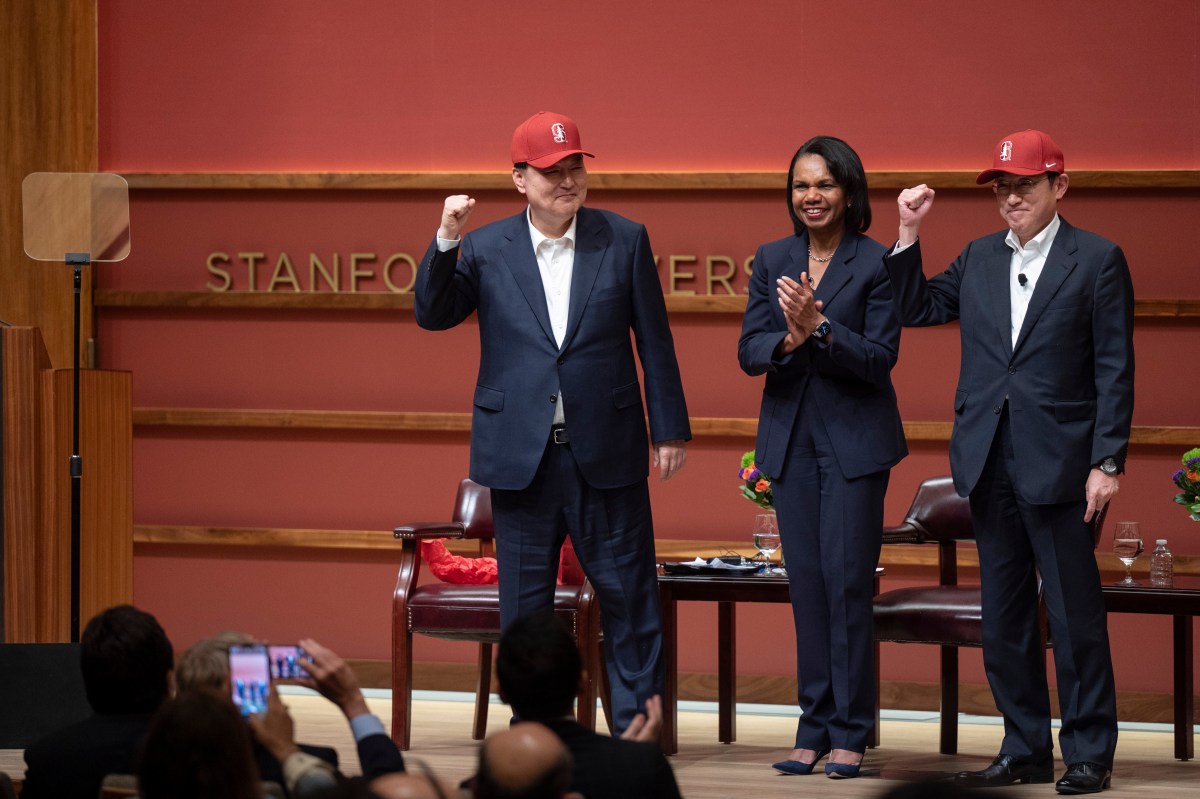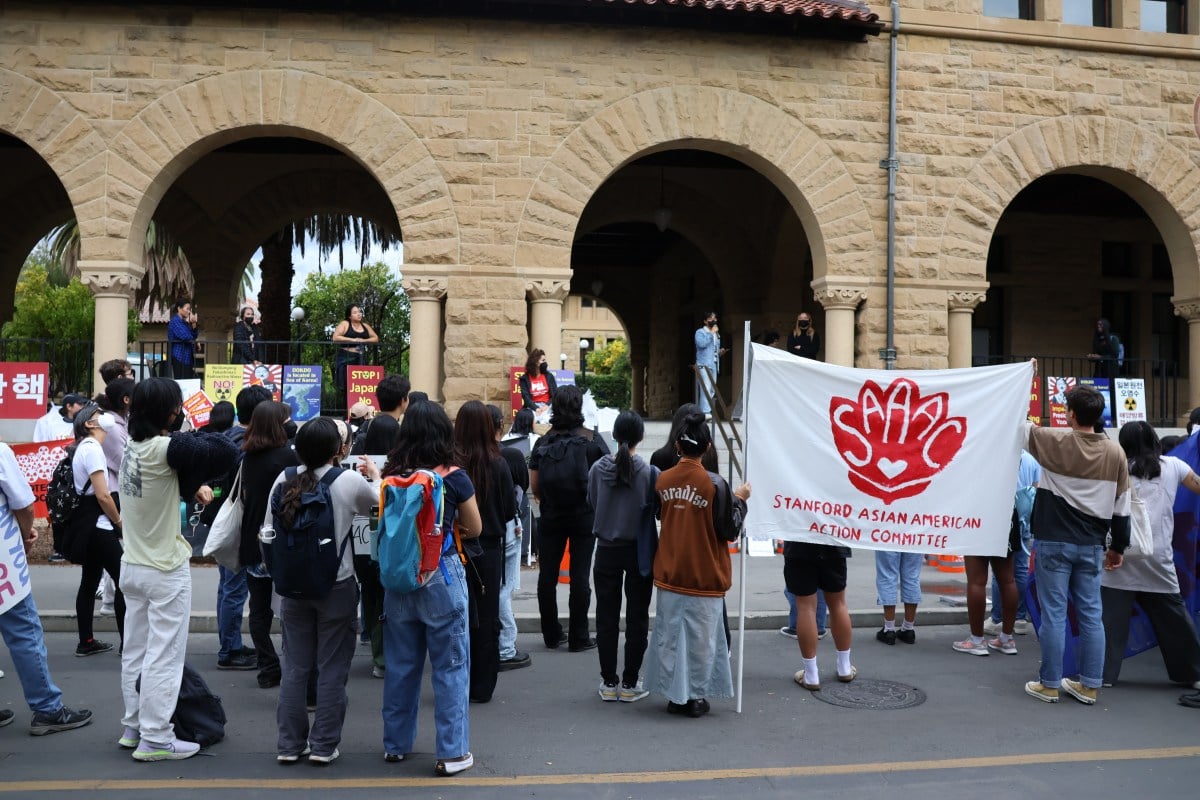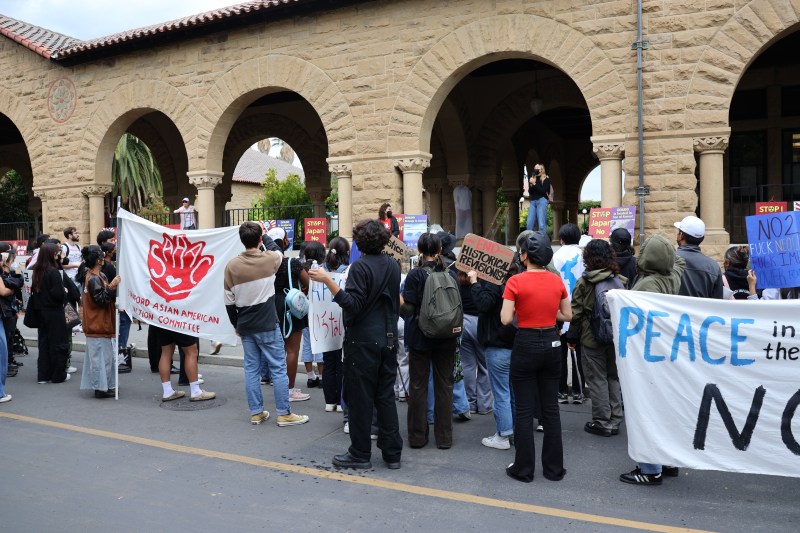Donning red baseball caps with the Stanford logo, Japanese Prime Minister Fumio Kishida and South Korean President Yoon Suk Yeol stood on stage with fists to the air beside former Secretary of State Condoleezza Rice.
“I heard tomorrow is the Big Game,” Yoon said. “Go, Stanford!”
The summit of world leaders, held at the Hoover Institution on Nov. 17, spoke to the importance of cooperation between the Republic of Korea, Japan and the U.S. for the future of science and technology.
Outside the building, “No to APEC” protesters gathered near the guest entrance, voicing opposition to the summit and U.S. involvement in the Pacific. “Stanford will frame the trilateral summit as promoting ‘peace and prosperity in the region,’ omitting and obscuring the warlike posturing, land dispossession … and collusion with genocide engendered by … summit participants,” read a public statement.
The “No to APEC” coalition has previously interrupted similar APEC seminars held at Stanford. During the annual APEC summit the previous day, where Yoon and Kishida had met briefly with U.S. President Joe Biden, protesters also blockaded the Fifth and Mission streets in San Francisco.
During the discussion, Kishida and Yoon sat on either side of Rice, director of the Hoover Institution and the moderator of the event, who opened the discussion on climate change, carbon neutrality and quantum technology.

Kishida praised Stanford for its innovations that, according to him, have contributed to global technological progress. He said that innovations from “a global ecosystem of start-ups” are particularly needed to address problems like climate change.
Yoon said “game-changer” innovations like AI, quantum science and 6G are “changing the future of mankind,” but cautioned of privacy and safety threats like potential breaches of encrypted data.
Kishida and Yoon concurred that the Camp David trilateral summit with Biden in August strengthened the alliance between the three states, which they described as critical amid security threats from China and North Korea.
Japan-Korea relations have since expanded to include cooperation on challenges introduced by advancements in science and technology, like supply chain and security issues, Yoon said. The trilateral summit between Biden, Kishida and Yoon was the first-ever stand-alone summit between the leaders of the U.S., Japan and South Korea.
“Cooperation between allies and like-minded nations is more important than ever,” Kishida said.
Among the audience were professors, entrepreneurs, delegates from both countries and a limited number of invited students.
Ryota Sato ’25, one of 15 Stanford students invited to a private meeting with Kishida before the summit, described the prime minister as “a very friendly figure.”
It was “like a conversation I would have with my uncle,” Sato said.
For Alex Ravel ’26, Kishida’s humor about ChatGPT writing his opening remarks and Yoon’s support for the Stanford football team in advance of Big Game livened the summit.

Just outside the Hoover Institution, around 50 “No to APEC” protesters hoisted signs, chanted slogans and beat makeshift drums. Beneath the rain, they wore plastic ponchos.
Contrasting the optimistic perspective that the world leaders inside took on Camp David, several speakers at the protest disapproved of and criticized the trilateral summit.
Yungsu Kim ’25, a member of the Stanford Asian American Action Committee (SAAAC) who spoke at the protest, said the summit led to collective military escalation in the Pacific by the U.S., Japan and South Korea, “increasing tensions in an area that already seems like it’s on the brink of war.”
“The only real demand[s] we’re echoing … [are] divestment calls already being made by other students on campus,” Kim said, referring to similar protests at previous APEC events at Stanford.
Some protesters said they felt the trilateral summit to be part of American efforts to increase control over the Pacific and elevate U.S. interests over those of regional peoples. Chants from the crowd called Yoon a “U.S. puppet” and “traitor.”
The protest drew communities from beyond campus too, including an activist group from Los Angeles that raised environmental concerns related to radioactive wastewater in the Pacific. Holding signs reading, “No Dumping Fukushima’s Radioactive Water!” they chanted, “Stop ocean dumping now!”
The Fukushima Daiichi nuclear power plant, which suffered a nuclear meltdown after a magnitude 9.1 earthquake and tsunami hit Japan in 2011, recently released a third batch of radioactive water into the sea, sparking protests from fishing groups and demonstrations in South Korea.
Other protesters criticized the U.S.’ historical presence in the Pacific, including the use of inhabited islands as bomb testing sites.
“I grew up hearing stories of our islands being colonized for ‘strategic’ reasons and how a lot of the Indigenous peoples were assimilated and murdered,” said David Apineru ’27, a native of American Samoa.
“Our islands were used as bomb testing sites where [the U.S.] just dropped bombs on our islands, [and] we still feel the effects,” Apineru said. “Hearing about the nuclear waste dumping into the Pacific infuriated me.”
Kim said that today, the expansion of U.S. bases in the region continues to hurt the Indigenous people of those lands.
Protesters said victims of escalating militarism also included “comfort women,” or women forcibly trafficked to Japanese military brothels during the Sino-Japanese War and World War II. They held a grieving ceremony that included Korean shaman-inspired dancing.
The public statement condemns “the historical denialism enforced by summit participants that forbids comfort women, forced laborers and all other victims of US and Japanese war crimes from seeking proper justice.”
The protesters voiced strong criticism of current and previous U.S. leaders for their support of American military presence in both the Pacific and elsewhere, using expletives against Biden, Rice, former President Barack Obama and former Secretary of State Hillary Clinton.
Yells of “From Okinawa to Korea to the Philippines, stop the U.S. war machine!” resounded through nearly all three hours of the demonstration, which lasted until the heads of state left.
Demonstrators also condemned the gathering countries’ involvement in arms trade and security cooperation with Israel amid the ongoing Israel-Gaza conflict. The group repeatedly called for “Ceasefire now!”
Around halfway through the summit, the group paraded around Main Quad, briefly stopping on the steps facing the Oval to hear speeches from students attending the event. The march proceeded through the center of Main Quad before returning to the front of the Hoover Institution shortly before the event ended.
Junah Jang ’25, a protest organizer who led many chants, said the demonstrators’ goal was to “raise visibility around the fact that there is a very active opposition to this alliance.”
“We hope to use this momentum to start building a coalition around these types of issues in the Asia-Pacific region,” she said.
